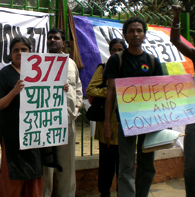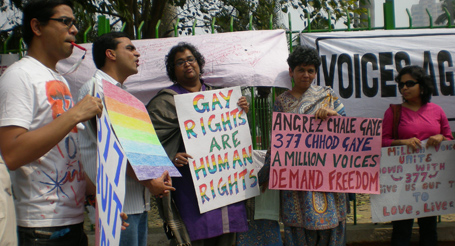The article has been updated on May 8, 2008. The organisation that filed the petition in the Delhi High Court in 2001 is Naz Foundation India and not Naz Foundation International as originally reported.
The police raid of a Naz Foundation International HIV/AIDS awareness workshop in the northern Indian city of Lucknow in 2001 is seen by many as the catalyst for a now five-year-long public interest litigation. The arrested staff had been interrogated and imprisoned under Section 377
of the Indian Penal Code. Shortly after, the Naz Foundation India filed a petition in the Delhi High Court.
Section 377 is rooted in convoluted Victorian language and morality and conviction can carry a sentence of up to ten years imprisonment. "Carnal intercourse against the order of nature with a man, woman or animal shall be punished," reads the article. Perpetrators of abuse against the LGBT community in India take advantage of its ambiguity, and various possible interpretations.
The raid of the workshop in 2001 sent a clear message to organisations doing work on HIV/AIDS and men who have sex with men (MSM), says Sumit Baudh, Senior Program Associate for SSARCS, which is based in New Delhi. "To be living under the threat of criminality when there was so much work - and there is still so much work to be done about HIV/AIDS - has done a huge disservice to the NGO sector."
The vagueness of Section 377 and the arbitrary application of its use prompted the formation of Voices Against 377, a coalition of NGOs and progressive groups opposed to the discriminatory legislation.
Baudh, whose organisation is a Voices Against 377 member says: "The Indian judiciary have interpreted Section 377 to mean anal intercourse, oral intercourse, and even mutual masturbation. The underlying premise is that natural means penile/vaginal penetrative sex, and sex that involves procreation."
Consequently, there are a range of queer people who are obvious suspects under the law says Baudh.
"Men who have sex with men, variously defining themselves as gay (mainly English speaking and educated) or kothi (non-gay identifying men who have sex with men) and hijira (broadly male-to-female transgender.) There is an assumption that when two men are together they will be engaging in anal sex. As such people think homosexuality is criminalised but the irony is that homosexuality is not mentioned in the law.
"Section 377 creates a stigma, an entire myth that homosexuality is criminal or illegal."
There is nothing mythical about the 'Gay Bashings' section of the GayBombay website where members share their ordeals. Previously there was also a subheading for 'Gay blackmail - a report in the making' which highlighted the extent to which LGBT people in India are the victims of entrapment, blackmail and extortion.
Other indignities suffered by LGBT people in India include conversion therapy, says Baudh. "There are instances of torture and trauma where individuals are given shock therapy a couple of days before their wedding when there is anxiety about a marriage, and people think that shock therapy might be the answer."

"It is something the LGBT movement grapples with because it's a catch 22 situation. We don't want to be talking about same sex desiring women because we don't want to attract the criminal liability, which in law actually doesn't exist. At the same time women face the stigma and threat caused by this criminality and can't do advocacy work as a result."
It's not only the government and conservative attitudes that Voices Against 377 is fighting. In 2002, an Indian NGO which also conducts HIV/AIDS awareness programs filed an intervention with the Delhi High Court against the Naz Foundation India petition. The Joint Action Council Kannur (JACK) made the intervention on many grounds, including that HIV doesn't exist, and that NGOs such as the foundation are merely sponsored agencies of pharmaceutical companies. The High Court rejected the JACK intervention but the organisation was made a party to the case, and their point of view will be heard and considered by the court.
In 2006 Voices Against 377 filed an intervention in the high court in support of the Naz Foundation's stand - to decriminalise consensual same-sex sexual activity. In the same year, author Vikram Seth and former UN Under-Secretary General Nitin Desai amongst others circulated an open letter in support of repealing Section 377.
When the Delhi High Court announced on April 7 that the next hearing of the Naz Foundation India petition would be May 19 it had been more than a year since there was a response from the court, says Baudh. "The queer community was getting anxious and losing patience." The new hearing date has renewed momentum for the campaign.
The presentation of the petition by an organisation rather than an individual has been another obstacle in the fight against Section 377. Baudh hopes the right kind of media coverage will give the petition a greater chance of success as well as a personal profile.
"Positive portrayals of LGBT people in the press and on television should lend comfort to any judge on the bench that there are people who are directly affected by this law and that it is something that calls for immediate attention. A lot of discussion within our movement has been around how to build a campaign. Who will be the face of the community? Who will come out?
"Having said that, there are some very brave people who have done it; Ashok Row Kavi (pioneering Indian gay activist and co-founder of the Humsafar Trust, a Mumbai based HIV/AIDS outreach service) for example, and more recently Prince Manvendra Singh Gohil (founder of Lakshya Trust, an HIV/AIDS awareness organisation.) These people have created a certain visibility in the media."
Baudh is cautiously optimistic about the outcome of the hearing. "There have been two interventions in this case and in light of this opposition it is hard to say what the outcome will be. Also, this case has been moving from one court to another and there have been different sets of judges. Any comments will be closely speculated upon."
Support the Voices Against 377 coalition to decriminalise consensual same-sex sexual activity by signing the Voices Against 377 Open Letter at: p2.voicesagainst377.org.












 Printable Version
Printable Version










Reader's Comments
Singapore's Section 377A is the same = against gay..
no government has the write to legislate my ass.that is my private life and human rights as gay .i was one year in India and know the problems the law implies , they even stop couples from being too tender in the parks , morality has a problem with itself . pornographic too . well all have skin why is it a sin to show any part of any body.
India has given us some of the greatest and most compassionate human beings to have lived, and from their teachings I think they would all be supportive of this action. Some Gandhi quotes:
"An unjust law is itself a species of violence. Arrest for its breach is more so."
"I like your Christ, I do not like your Christians. Your Christians are so unlike your Christ. "
"First they ignore you, then they laugh at you, then they fight you, then you win."
"When I despair, I remember that all through history the way of truth and love has always won. There have been tyrants and murderers and for a time they seem invincible but in the end, they always fall -- think of it, ALWAYS".
- Mahatma Gandhi
Please log in to use this feature.